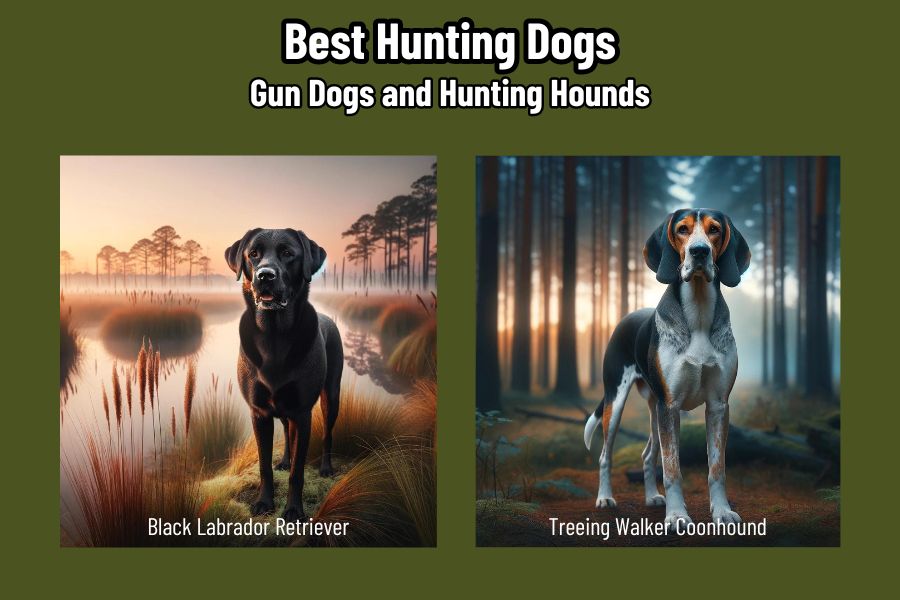Explore the world of the best hunting dogs, from intelligent gun dogs to enduring hunting hounds. In this guide we’ll cover key characteristics, roles, and breeds that make these dogs indispensable companions in modern hunting. Learn about retrievers, pointers, setters, spaniels, sighthounds, and scenthounds, and discover why these dogs are celebrated as the best hunting dogs!
Introduction
Imagine the crisp morning air filling your lungs, the distant sound of birds chirping, and the soft rustle of leaves underfoot. At your side, a loyal companion, highly attuned to their environment and ready to spring into action. Be it gun dogs or hunting hounds, throughout history, these dogs have not only been aids but also cherished partners in the hunt. Their evolution from the ancient guardians of nomadic tribes to the best hunting dogs of today showcases remarkable adaptability and a deep-seated bond every hunter longs for.
In the modern hunting landscape, the roles of gun dogs and hunting hounds have become refined. Whether flushing out game or tracking a scent trail, these dogs enhance the hunting experience, bringing both skill and spirit to the pursuits. The choice of the right hunting dog is crucial, not only for successful hunting but also for fostering a rewarding companionship with your dog.
So, whether you’re a seasoned hunter or new to this age-old practice, let’s begin our exploration of what makes the best hunting dogs truly outstanding.
What Makes A Good Hunting Dog?
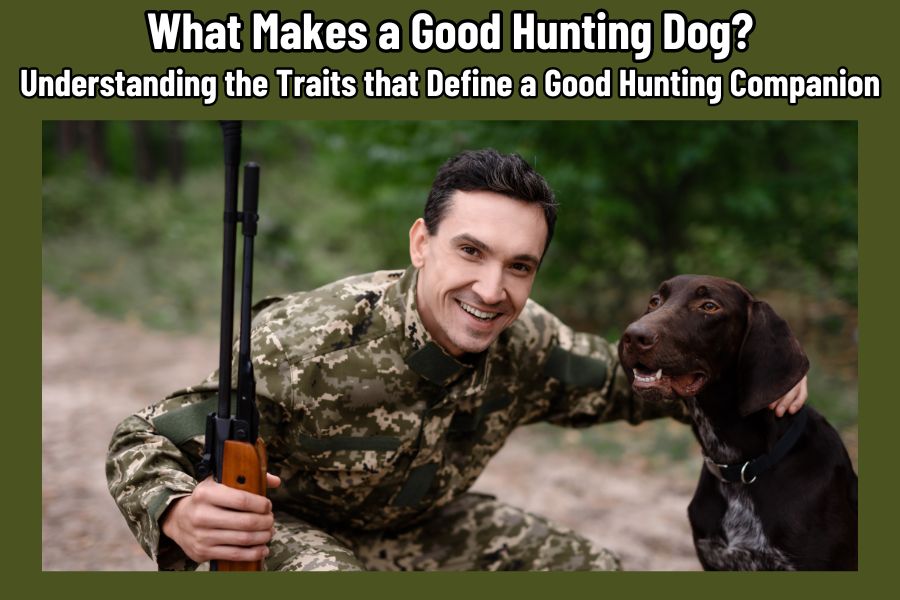
Choosing the right hunting companion goes beyond just picking a breed; it involves understanding the traits that define a good hunting dog. The ideal hunting canine isn’t just a pet but an essential part of the hunt. In this section, let’s explore some of the key qualities that make a good gun dog and hunting hound.
Intelligence
A good Gun dog and hound possess a sharp intelligence, which is crucial for quickly learning and adapting to varied hunting scenarios. Intelligent dogs are adept at solving problems in the field, whether it’s navigating difficult terrain or strategizing the best approach to locate game.
Trainable
Trainability is key in a good hunting dog. A dog that responds well to training can effectively learn hunting commands and signals much quicker. This responsiveness ensures smooth communication between the hunter and the dog. Hunting dogs that are easy to train often form a deeper bond with their handlers, leading to a more synchronized partnership and ultimately successful hunting.
Good Personality
The personality of a hunting dog greatly influences its compatibility with its handler and its effectiveness in the field. For example a good gun dog that remains calm and is able to control its emotions is often more adaptable to long waiting periods during hunts and less likely to startle game. Or like a good hunting hound that must remain focused while tracking prey on long hunts.
Athleticism and Stamina
Athleticism and stamina are essential for enduring long hunting sessions and traversing challenging landscapes. Dogs with these qualities can sustain their energy levels over hours of tracking and retrieving, making them indispensable companions in rigorous hunting adventures.
A Strong Work Ethic Enjoys the Hunt
The best hunting dogs display a strong work ethic, showing eagerness and joy in the pursuit of game. This intrinsic motivation not only improves the dog’s performance but also makes the hunting experience more enjoyable and fulfilling for both the hunter and the dog.
A Great Nose For Scent and Tracking
An exceptional sense of smell is a defining trait of a good hunting hound. This ability enables them to track game over long distances and through complex environments, which is pivotal in hunts for small game and big game.
A Strong Swimmer, Loves the Water
For waterfowl hunting, the love for water and strong swimming abilities are indispensable. Gun dogs, especially retrievers are natural swimmers and love retrieving game from water bodies which expands the hunter’s reach and success rate.
Loves to Retrieve, Long Muzzle, Gentle Touch
The instinct to retrieve is vital for hunting dogs. Gun dogs have a long muzzle and a gentle touch. These dogs can fetch and carry game without damaging it, preserving the integrity of the catch—a crucial part of bird hunting.
Emotional But Maintains Self-control
While emotions can run high in every hunt, self-control is essential to prevent over excitement or distractions during the hunt. Good hunting dogs, gun dogs and hounds alike can balance these traits ensuring that both hunter and dogs get the most out of every hunt. Reliability is key to a successful hunt.
Best Gun Dogs – Retrievers, Pointers, Setters, and Spaniels
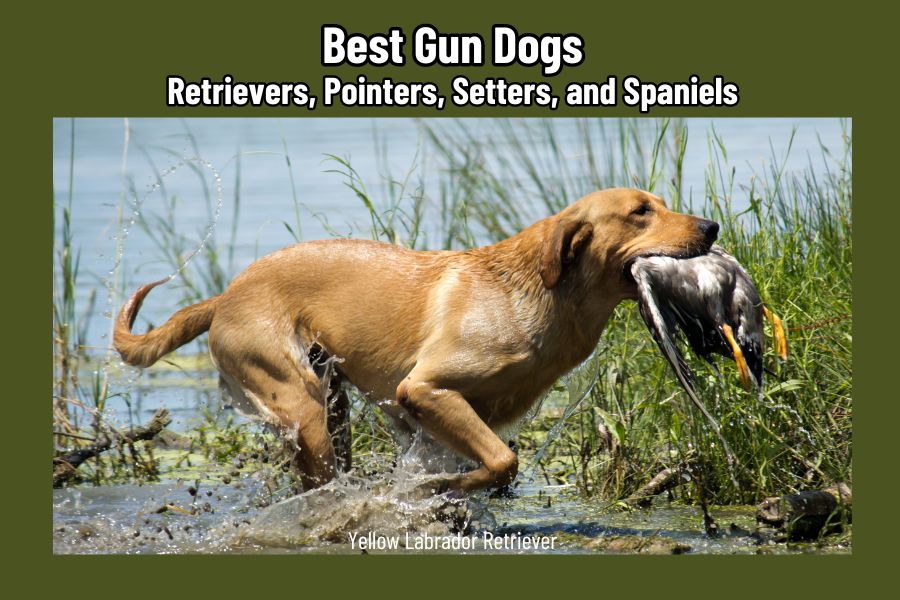
The legacy of gun dogs traces back centuries to Europe, where they were developed to assist hunters in the age-old sport of bird hunting. These dogs are not just skilled hunters but also exemplify the perfect blend of partnership and tradition in the hunting world. Today, best gun dogs encompass a variety of breeds, each tailored to specific hunting needs but all marked by their effectiveness and loyalty.
Characteristics that define a Gun Dog
Best gun dogs are celebrated for their remarkable ability to balance energy with obedience, making them ideal companions in the hunt. Their main roles include locating, flushing, and retrieving game, skills that require acute sensory capabilities and high levels of training. These dogs are inherently active, social, and driven by a desire to please, which not only makes them excellent hunters but also loyal family members.
Retrievers – The Loyal Retriever
Originating from the UK and North America, Retrievers were bred primarily for retrieving game in water and on land. The hallmark of the Retriever is its soft mouth, designed to retrieve game without damage. Their primary role in hunting is to wait, watch, and retrieve the game once it has fallen. The best retrievers include breeds like the Labrador Retriever, Golden Retriever, and Chesapeake Bay Retriever, each valued for its endurance, intelligence, and gentle retrieval.
Pointers: The Precision Hunters
Pointers, known for their methodical searching and the unique stance they adopt upon locating game, originated in England and Spain. Their primary role is to locate game and remain in position, allowing the hunter to catch up and prepare for the shot. Among the best pointers are the English Pointer and the German Shorthaired Pointer which are renowned for their concentration, agility, and precision in the field.
Setters: The Graceful Flushers
Setters, originating from France and the British Isles, are known for their graceful movement and endurance. Their role extends beyond locating game; they also flush birds out of hiding. The best setters like the English Setter, Irish Setter and Gordon Setter, among others, are popular for their feathering coats and exceptional ability to cover large areas efficiently, making them indispensable for upland game hunting.
Spaniels: The Versatile Game Flushers
Spaniels have a rich history that dates back to Spain and later spread across Europe. They are skilled in flushing game from dense underbrush. Some of the best spaniels such as the Cocker Spaniel and the Springer Spaniels are particularly adept at working in varied terrains, from wetlands to thick forests. Their versatility and energy make them exceptional for flushing and retrieving tasks.
Special Cooperation and Self-control of Gun Dogs
The best gun dogs are trained to exhibit a high degree of self-control and cooperation. This training ensures that they can perform effectively under the stressful conditions of a hunt, responding to their handlers’ commands amidst distractions. The field etiquette required of these dogs is strict; they must remain calm and collected while awaiting their turn to spring into action, showcasing a poised demeanor that belies their eager spirit.
The best hunting dogs always includes gun dogs. Their unique combination of traits and trained behaviors make them not only effective hunters but also beloved partners in the field and at home.
Best Hunting Hounds – Sighthounds and Scenthounds
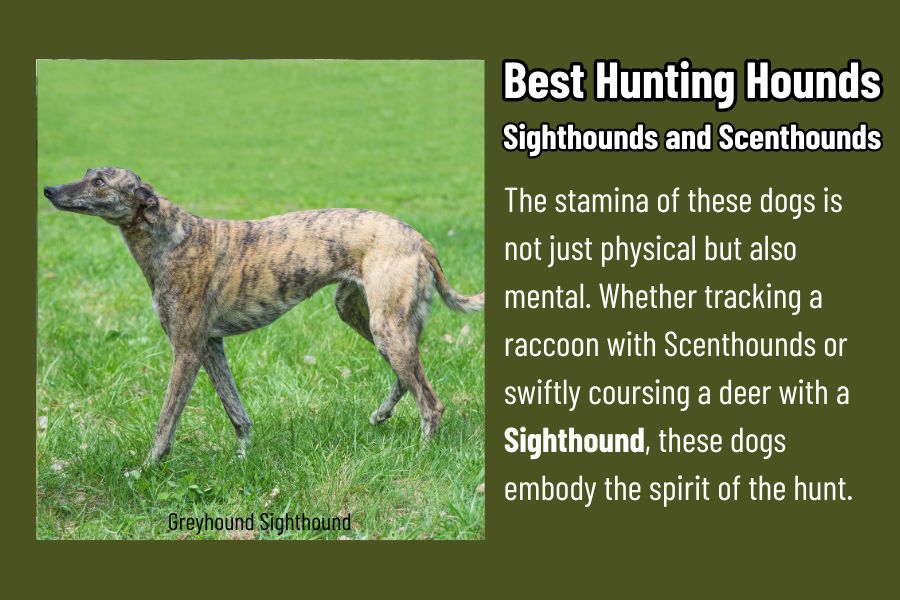
The lineage of the best hunting hounds is as old as civilization itself, tracing back to ancient Egypt and Rome, where they were esteemed for their prowess in hunting. These dogs are split into two primary groups: Sighthounds, which hunt primarily by sight, and Scenthounds, which rely on their superior olfactory senses. Each type brings unique abilities to the hunt, making them invaluable assets in pursuit of game across diverse terrains.
Characteristics that define a Hunting Hound
The best hunting hounds are distinguished by their extraordinary sensory abilities and specialized skills. Sighthounds are renowned for their visual acuity and incredible speed, making them perfect for chasing down fast-moving prey. Scenthounds, on the other hand, excel with their relentless tracking skills, using their nose to follow trails over long distances and through challenging environments. Both types exhibit a deep dedication to the task and are easier to train when their natural instincts are harnessed.
Sighthounds – Visual Acuity and Speed
Originating from the arid landscapes of the Middle East, Sighthounds were bred to spot and chase down prey at high speeds. Their slim, aerodynamic builds enable them to achieve impressive speeds, making them the sprinters of the canine world. The primary role of Sighthounds in hunting is to pursue game swiftly and silently, often catching it before it has a chance to hide. Some of the best sighthounds like the Greyhound, Whippet, and Saluki are celebrated not only for their speed but also for their elegant, graceful demeanor.
Scenthounds: The Masters of Scent
Scenthounds have their roots in Europe and Asia, where they were developed to track game using their exceptional sense of smell. Unlike their Sighthound counterparts, Scenthounds may not be as fast, but their endurance and persistence make them unmatched in pursuits through dense undergrowth and over rough terrains. Some of the best scenthounds such as the Bloodhound, Beagle, Plott Hound, and Treeing Walker Coonhounds are highly regarded for their ability to follow scents for miles, often over complex trails that would confound other dogs. Some of these breeds have deep, booming barks that help the hunter follow the dog throughout the chase.
The Stealth and Stamina of Hunting Hounds
The Best hunting hounds demonstrate a unique blend of stealth and stamina, capable of long, enduring chases and tactful approaches to prey. This makes them particularly effective in both open fields and dense woods. The stamina of these dogs is not just physical but also mental, as they remain intensely focused and driven throughout the hunt. Whether tracking a fox with a Scenthound or swiftly coursing a deer with a Sighthound, these dogs exemplify the spirit of the hunt.
Why Gun Dogs and Hounds Make the Best Hunting Dogs?
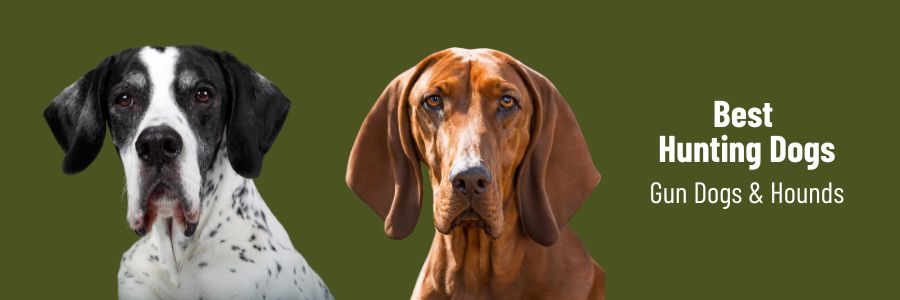
In the realm of hunting, the canine partners chosen can make a significant difference in both the process and the outcome of the hunt. Best hunting dogs, such as gun dogs and hounds, stand out for their specialized skills and adaptability to various hunting scenarios. These dogs are not only effective hunters but also enhance the hunting experience through their unique traits and behaviors.
Gun Dogs
Gun dogs, often hailed as the quintessential best hunting dogs, serve as perfect companions for both the hunt and the home. These breeds, including retrievers, setters, pointers, and spaniels, are specifically trained to work in close cooperation with hunters using loud firearms such as a shotgun.
The origins of gun dogs are deeply rooted in European hunting traditions, where they were indispensable in bird hunting. Their primary role is to find, flush out, and retrieve game, typically birds such as ducks and pheasants, from both land and water.
The versatility of gun dogs is showcased in their ability to adapt to a variety of hunting styles and environments, making them invaluable to small game hunters who rely on shotguns. What truly sets gun dogs apart is their dual role as both rigorous hunting aides and gentle, loyal family pets, capable of switching from high-energy field activities to a calm domestic life.
Hunting Hounds
Contrasting with gun dogs, hounds were among the earliest types of hunting dogs to be developed, tracing their lineage back to ancient civilizations. Hounds are broadly categorized into two types: sighthounds and scenthounds, each equipped with either exceptional speed or an extraordinary sense of smell. This sensory specialization enables them to excel in tracking and pursuing prey over great distances and through challenging terrains.
Hounds are known for their keen intelligence, strong instinct for pursuit, and an enduring stamina that makes them relentless hunters. Beyond their hunting capabilities, hounds are celebrated for their deep connection with humans, a relationship that has been honored in countless cultural expressions, from classic literature to traditional folk songs. The enduring legacy of hounds is not just in their hunting proficiency but in their role as symbols of fidelity and courage across various cultures and eras.
Both gun dogs and hounds make the best hunting dogs because they are not only effective in fulfilling their hunting roles but also enrich the lives of those who train and hunt with them. Their attributes go beyond mere physical capabilities, reflecting centuries of breeding, training, and companionship, making them irreplaceable in the hearts and histories of hunters around the world.
Closing Thoughts: Gun Dogs and Hounds
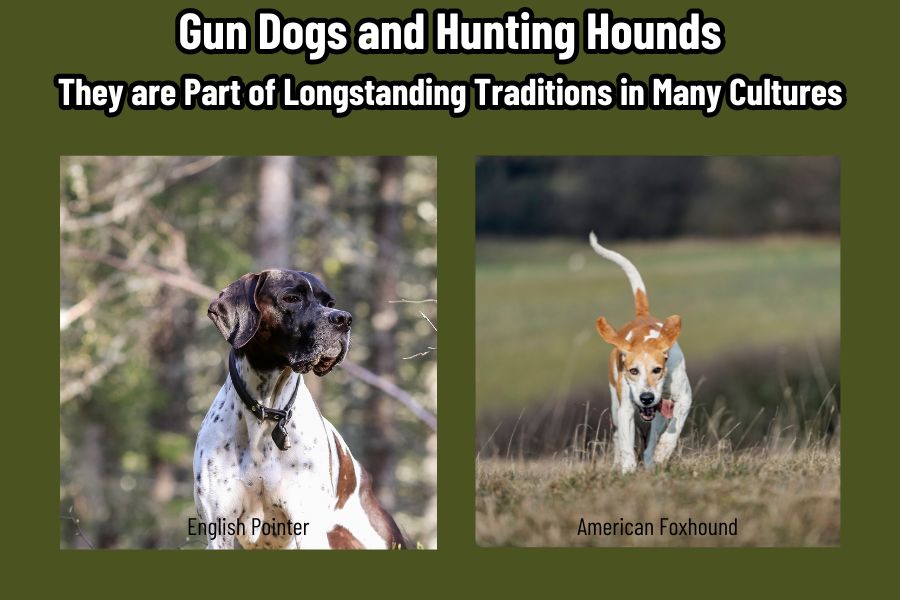
As we wrap up our journey about the best hunting dogs, it’s clear that both gun dogs and hounds are more than just pets; they are integral parts of the hunting experience and longstanding traditions in many cultures. From the sharp intelligence and versatility of gun dogs to the unmatched sensory skills and stamina of hounds, these dogs have shaped and been shaped by human history.
Whether you’re a seasoned hunter or just starting out, remember that choosing the right dog can make all the difference. These dogs aren’t just helping you hunt; they’re bringing joy and fulfillment that lasts far beyond the hunting season.
Imagine standing in the quiet of dawn, your trusted dog companion by your side, ready to share in the day’s adventure. It’s a partnership that goes beyond the hunt, touching on deep bonds formed through shared experiences and mutual respect. Here’s to many successful hunts and the loyal dogs that make them all the more memorable!
FAQs: Best Hunting Dogs
What are the key differences between gun dogs and hounds?
Best Hunting Dogs Answer:
Gun dogs are primarily trained to assist hunters by retrieving game, often birds, that has been shot down. They are especially skilled in working closely with hunters, responding to commands, and handling the proximity to firearms. On the other hand, hounds are categorized into sighthounds and scenthounds, excelling in tracking and pursuing prey based on sight or scent. Sighthounds are known for their speed and visual acuity, while scenthounds use their exceptional sense of smell to follow trails over long distances.
How do I choose the right type of hunting dog for my needs?
Best Hunting Dogs Answer:
Choosing the right hunting dog depends on the type of hunting you plan to do. If your focus is on waterfowl, a retriever with a soft mouth and good swimming ability would be ideal. For upland bird hunting, consider a pointer or a setter that excels in finding and flushing out game. If you want to focus on coon hunting, a scenthound might be the best choice for tracking. Consider your hunting environment, the game you target, and also the dog’s temperament and training needs.
Which dog makes the best hunting and family dog?
Best Hunting Dogs Answer:
The best hunting and family dog is a gun dog. Gun dogs are often described not only as excellent hunting partners but also as wonderful family pets. They are known for their friendly and gentle nature, making them great companions at home. Breeds like Labrador Retrievers and Golden Retrievers are particularly noted for their sociability and patient demeanor with children.
What training does a hunting dog need?
Best Hunting Dogs Answer:
Hunting dogs require comprehensive training that starts from a young age. Basic obedience is crucial, as are more specialized commands related to hunting. This training includes teaching the dog to follow trails, respond to hand signals and whistles, and retrieve game without damaging it. Consistency, patience, and positive reinforcement are key components of training a hunting dog. It takes patience and consistency to train a hunting dog. Hiring a professional trainer may be your best choice.
How do I maintain the health and fitness of my hunting dog?
Best Hunting Dogs Answer:
Maintaining the health and fitness of a hunting dog involves regular veterinary check-ups, a balanced diet, and plenty of exercises. Hunting dogs require physical conditioning and mental stimulation to stay sharp and perform well in the field. Regular training sessions, interactive play, and exercise tailored to the dog’s specific hunting role are essential for keeping your hunting dog in top condition.
Why are Gun Dogs and Hounds Classified as the Best Hunting Dogs?
Best Hunting Dogs Answer:
Gun dogs and hounds are classified as the best hunting dogs due to their specialized skills, impeccable training adaptability, and deep-rooted history in hunting alongside humans. These classifications stem from their respective abilities to effectively assist hunters in very specific ways:
- Gun Dogs: which include retrievers, spaniels, pointers, and setters, are primarily trained to assist hunters in locating and retrieving game, especially birds. They are highly valued for their ability to retrieve game gently and undamaged.
- Hounds: divided into sighthounds and scenthounds, specialize in using their acute sensory perceptions—sight and smell, respectively—to track and hunt game. Known for their sight, speed and unparalleled sense of smell.
- Complementary Skills and Versatility: the classification of gun dogs and hounds as the best hunting dogs also reflects their complementary skills that cover a wide range of hunting needs. From water retrievals to endurance tracking, these dogs fulfill diverse roles that many other breeds cannot.
- Emotional and Social Bond: beyond their functional abilities, gun dogs and hounds are also cherished for the emotional and social bonds they form with their handlers. These dogs are not only working partners but also become part of the hunter’s family.
Resources: Best Hunting Dogs
These resources provide a wealth of information and support for everyone from novice hunters to experienced handlers looking to deepen their understanding and enhance their practices with hunting dogs.
SPECIAL NOTE: “The information provided in this post about best hunting dogs is based on research using the Resource links listed below. While we try to keep the information for this post current, there are no representations expressed or implied, about the completeness, or accuracy of the information provided. Therefore all hunters should always verify current information from these resources along with other local and federal publications”.
Clubs and Organizations
- American Kennel Club (AKC) – Offers resources for all dog breeds, including standards, training advice, and information on dog sports related to hunting. American Kennel Club Website
- United Kennel Club (UKC) – Focuses on hunting dog competitions and preserving the working heritage of all dogs. United Kennel Club Website
- Canadian Kennel Club (CKC) – Provides a broad spectrum of information on dog breeds, including hunting dogs, and organizes events in Canada. Canadian Kennel Club Website
- Congressional Sportsmen’s Foundation – Works to protect and advance hunting and other sporting traditions in America. Offers insights into legislative actions affecting hunting. Congressional Sportsmen’s Foundation Website
- North American Versatile Hunting Dog Association (NAVHDA) – A nonprofit that evaluates the performance of versatile hunting dogs, emphasizing their utility in the field. NAVHDA Website
Books
- “Training the Versatile Hunting Dog” by Chuck Johnson – This book shows you how to develop a versatile hunting dog that can be a family companion, pointing bird dog, retriever on land and water, and tracker of wounded game.
- “Gun Dog: Revolutionary Rapid Training Method” by Richard A. Wolters – An informative book on training hunting dogs specifically for retrieving.
- “The Complete Guide to Hunting, Butchering, and Cooking Wild Game: Volume 1: Big Game” by Steven Rinella – While not exclusively about hunting dogs, this book provides comprehensive insight into hunting practices that can be enhanced with the use of a hunting dog.
Check out our blog posts about hunting with dogs in…
Alabama
Alaska
Arizona
Arkansas
California
Colorado
Connecticut
Delaware
Florida
Georgia

